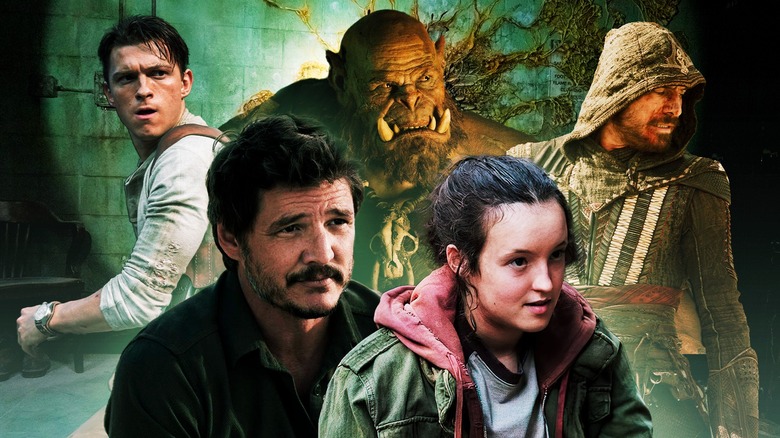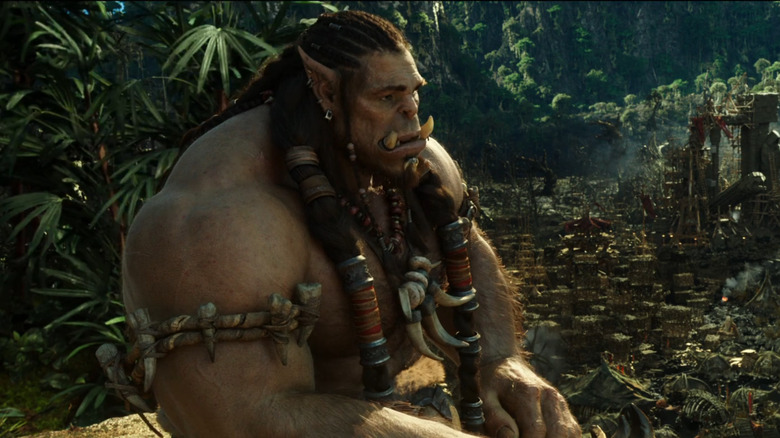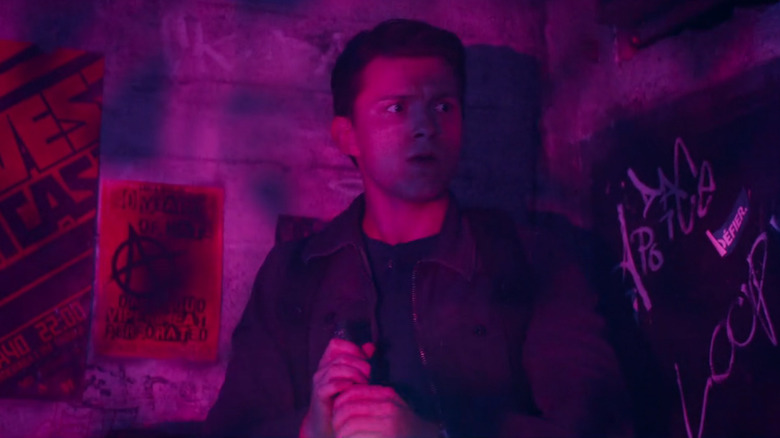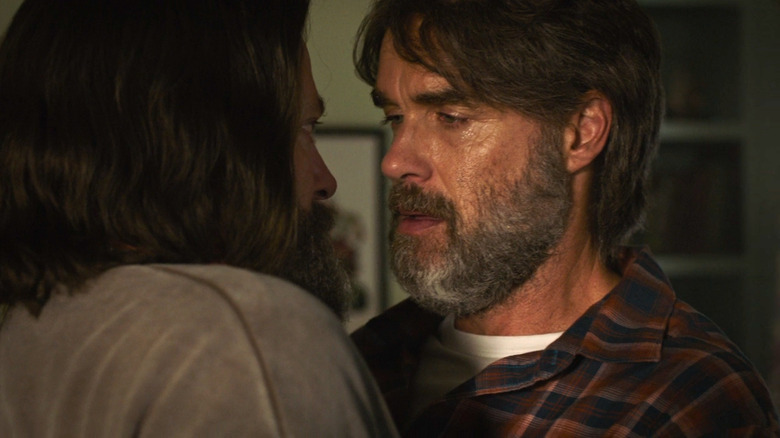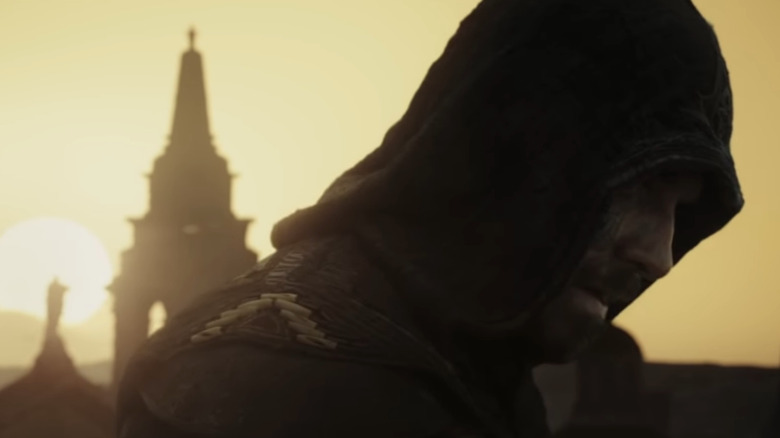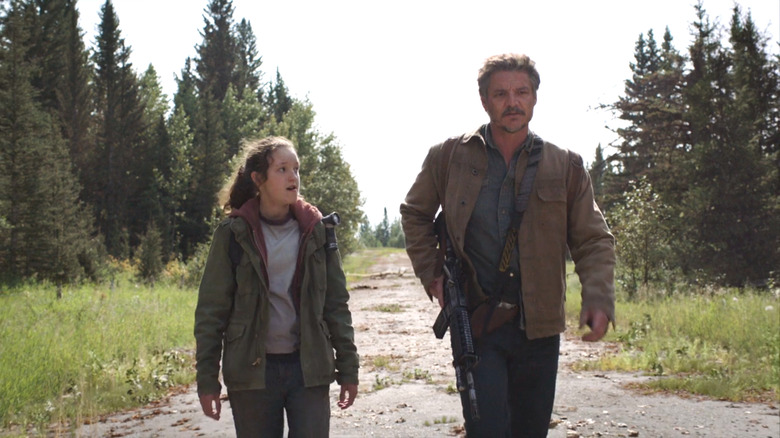The Last Of Us Proves Hollywood Has Finally Found The Cheat Code For Video Game Adaptations
To say that "The Last of Us" is among the finest shows currently on TV is hardly a bold statement. By now, it merely adds to an ever-growing chorus of praise. HBO's adaptation of the Naughty Dog game set in a mushroom zombie apocalypse is the rare piece of media that seems to have something for everyone. Pedro Pascal once more plays a sad surrogate father, while Bella Ramsey is the Grogu to his Din Djarin. If it sounds like it works on paper, it somehow works even better in practice. Leading up to the show's release, there were a lot of indicators that the show would be good, but few imagined it would be an instant contender for the best TV series of the year.
The reason for that hesitancy? Simply put, the history of video game adaptations is abysmal. From "Super Mario Bros." to multiple attempts at "Resident Evil" and "Mortal Kombat," there are far more failures than successes. Studios have consistently seemed flabbergasted by the entire concept of turning a game into a purely audiovisual experience, trying to treat it the same way they would the adaptation of a book.
But by studying those crashes, we can see exactly what it took for "The Last of Us" to soar. Prior attempts at translating video games to screen crammed 40-plus hour stories into two-hour films, copied over elements of gameplay that would never work without a controller, and either overcommitted to keeping things the same or shied away from the source material entirely. "The Last of Us" avoided those mistakes almost entirely, putting itself in the Goldilocks zone and elevating its material to instant classic status. In so doing, it provided a playthrough guide for other video game adaptations to come.
Game adaptations need room to breathe
The most glaring problem with most video game adaptations has been that Hollywood always assumed they should be movies. To be fair, there is some underlying logic to that approach. A feature budget was for a long time necessary to recreate the fantastical worlds offered to players. But compressing a 40-hour-plus narrative into 120 minutes is clearly a mistake from every other perspective. Games are longform narratives, and should remain such.
There's no better example of this than the hideously misguided "Warcraft." The 2016 film, directed by Duncan Jones, is not without its merits. It leans fully into the fantastical reality of its source material, rendering the characters of its magical realms with lush detail. But its 123-minute runtime is overburdened with exposition as the film realizes it must explain warring factions, fantasy races and realms, systems of magic, preexisting character relationships, and fantasy politics to its audience. It alienated new audiences and upset fans. The result is a lumbering beast of a film, as clumsy as an Orc that got hit with a "slow" spell.
"The Last of Us," by contrast, has room to breathe. The first episode deals with the Cordyceps outbreak, the second orients us in the present, post-apocalyptic setting as Joel and Ellie venture out of the Boston Quarantine Zone, and by Episode 3, we're ready to experience a self-contained love story set between those two points.
HBO's latest hit isn't alone, either. Netflix's animated "League of Legends" adaptation "Arcane" is much closer to "Warcraft," set in a magical realm of political intrigue, but because it has a season of television at its disposal it never needs to overwhelm its audience. The result is another stunningly beautiful and emotionally charged Emmy-nominated series that gets to focus on building out its characters rather than explaining what, precisely, a Krug is.
Cinematics, not game mechanics, make a good adaptation
The most egregious error video game adaptations have made is a matter of purpose. Video games, by their very nature, contain elements that fall flat without the interactivity of their intended medium. They are full of mechanics and progression systems meant not for the characters, but for the player. Consider, for example, the "Uncharted" series, in which noncombat gameplay is mostly comprised of puzzles. Playing as Nathan Drake, you enter an abandoned ruin and solve a complex system of visual riddles which unlock the next area of the map, set off traps, or both. These are some of the most enjoyable parts of those games, so it probably made sense (or seemed to) to copy them over when the franchise was adapted to film. But in practice, without the experientiality of solving the riddles yourself, watching them get solved by Tom Holland is rather boring. You may as well watch a Twitch streamer play "Drake's Deception."
"The Last of Us" deftly avoids copying gameplay mechanics that serve no purpose without a player to navigate them. Early in Episode 2, there's a hint of what a lesser show would have done with the material when Joel, Ellie, and Tess (Anna Torv) find their path through a ruined building blocked by fallen debris and Tess heads off to find another way through. The moment is clearly inspired by gameplay, which is full of movement challenges. Players are often tasked with finding alternate routes through the ruins of the post-apocalyptic world. The HBO series uses this moment to give Ellie and Joel a moment alone, but even so, it's impossible to watch without feeling the uncanny sense of watching real humans playact a video game mechanic.
Game adaptations need to find an original angle
When video game adaptations succeed, it is because they understand which elements of their source material will translate to a new medium and which will not. Characters, settings, and more are adaptable, but usually not in their original form, which is meant to be inhabited by a player rather than viewed by a passive observer. Anything purely designed for player engagement should be left out, while filling in those gaps with a stronger narrative.
So far, "The Last of Us" has perfect scores on all counts. Granted, it was starting with a game that already leaned more on story than gameplay, but so did "Uncharted," and that proved to be a total snooze-fest when copied to the big screen without any changes to the action-adventure narrative structure of the games. Meanwhile, "The Last of Us" took what works on TV and reworked what doesn't. The stunning, post-apocalyptic ruins of Boston remain with top notch set and character designs, but the show doesn't waste the time of viewers by copy-pasting gameplay into scenes. Yet, when it works, the show copies scenes from the game, frame-for-frame. There is love for the source material, not religious devotion.
When something wasn't working in the game, "The Last of Us" imagines something new. Take the episode "Long Long Time," in which we see the story of Bill (Nick Offerman) and Frank (Murray Bartlett), two men who find love in a hopeless place. The game's portrayal of these characters is not only less effective, but also cruel, as Bill finds his partner's body after his death and their relationship is relegated to an offhanded comment. On the show, this is completely reworked, turning a misguided bit of the game into something not only new, but transcendently beautiful.
There's no shame in the video game
While some game adaptations fail because they were too dedicated to the original material, others fall short by being ashamed of having been based on a game in the first place. For a long time, video games struggled to be seen as legitimate works of art, and the movies inspired by them were clearly made by people who felt as though their reputation would be tarnished by association.
The 2016 adaptation of "Assassin's Creed" is a product of that shame. Starring Michael Fassbender as Callum Lynch, a man who inhabits the body of his ancestor and joins the battle between Templars and Assassins. Though it retains the games' lore and has some fun action scenes, "Assassin's Creed" strips away the exuberant fun that papers over some of the most nonsensical elements of the source material. Without adjusting for the new tone, the resulting movie suffers. The only thing it assassinates is itself.
As it happens, the superhero genre suffered from a similar problem for most of its history on the silver screen. By the early 2010s, a "good" superhero movie was something like Christopher Nolan's Batman trilogy, which did away with the more fanciful aspects of comic book Gotham to create a grimdark tone that was more "realistic." It took the Marvel Cinematic Universe to break that trend, showing that superhero movies could be meaningful and still embrace the goofier elements of the books.
"The Last of Us" has done something similar. It does not shy away from its roots as a game, but it makes the changes necessary to keep things fun as a TV show in its own right.
The new blueprint for video game adaptations
Slowly, but with increasing frequency, Hollywood seems to have found the cheat codes for creating an excellent video game adaptation, and "The Last of Us" may go down as the first true classic of the genre. It got there not by doing something new, but by realizing that a television show, no matter its source, should be a show first and foremost. It adapts when it must, and takes inspiration where it can. Retrospectively, it would have been easy to look at a game like "The Last of Us" and decide that an adaptation should look like a compilation of cutscenes from it. That would have been the easy choice, the safe and obvious one. But "The Last of Us" is uninterested in safe, and it cares not for crowd-pleasing. It is focused with scalpel-like precision on serving its characters and its story. Yes, that story may dovetail with the events of the games, but it is not married to that version of the material.
Alongside other shows such as "Arcane," "The Last of Us" is a planted flag heralding a new era of video game adaptations. These shows are not mere anomalies — video game adaptations that accidentally transcended the mediocrity inherent to their genre — but rather blueprints for those that follow.
